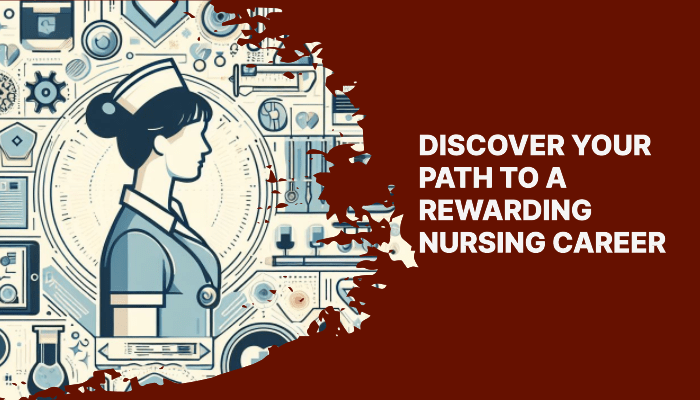
Nursing Roles, Responsibilities, and Skills - A Guide to Nursing Careers

24-Oct-2023
Who are nurses? What do they do?
A nurse is a person who has received formal education and training in nursing and who is licensed to practice nursing. Nurses provide a wide range of services to patients, including:
• Taking vital signs
• Administering medications
• Providing wound care
• Teaching patients about their conditions
• Counseling patients and their families
• Advocating for patients
Nurses work in a variety of settings, including hospitals, clinics, long-term care facilities, and home health care agencies.
Nurse as a career is best for a person with these personalities
Nursing is a career that is best suited for people who are compassionate, caring, and patient. Nurses work long hours and often deal with difficult situations, so it is important that they are able to remain calm under pressure and provide emotional support to their patients.
The top three personality types that are best suited for a career in nursing are:
Nurturing.
Nurses need to be able to provide emotional support to their patients and their families. They need to be able to understand what their patients are going through and offer comfort and reassurance.
Organized.
Nurses need to be able to manage their time and resources effectively. They need to be able to prioritize tasks and stay on top of their work.
Flexible.
Nurses need to be able to adapt to change and be flexible in their work. They need to be able to handle unexpected situations and be able to change their plans as needed.
Nursing is a rewarding career that can make a real difference in the lives of others. If you are a compassionate, caring, and patient person who is looking for a career that allows you to help others, then nursing may be the right path for you.
Step-by-step career plan

1. Get your high school diploma or equivalent. This is the first step to becoming a nurse, and it's important to make sure you have the necessary academic qualifications.
2. Take the entrance exam. The entrance exam is a standardized test that measures your academic readiness for nursing school. You'll need to score well on this exam in order to be admitted to a nursing program.
3. Apply to a nursing program. Once you've taken the exam, you can start applying to nursing programs. Be sure to research different programs to find one that's a good fit for you.
4. Complete your nursing program. Nursing school is rigorous, but it's also an incredibly rewarding experience. You'll learn everything you need to know to become a safe and effective nurse.
5. Pass the RN exam. The RN exam is the final step to becoming a registered nurse. You'll need to pass this exam in order to get your license to practice nursing.
6. Get a job as a nurse. Once you've passed the RN exam, you can start looking for a job as a nurse. There are many different nursing jobs available, so you'll be able to find one that's a good fit for your skills and interests.
7. Continue your education. Registered nurses are required to continue their education throughout their careers. This means taking continuing education courses, attending conferences, and reading nursing journals. By continuing your education, you'll stay up-to-date on the latest nursing trends and practices.
8. Become a certified nurse specialist (CNS). Certified nurse specialists (CNSs) are registered nurses who have advanced training in a specific area of nursing. CNSs provide expert care to patients, and they also teach and mentor other nurses.
9. Become a nurse practitioner (NP). Nurse practitioners (NPs) are registered nurses who have advanced training in primary care. NPs can diagnose and treat illnesses, prescribe medications, and order tests.
10. Start your own nursing business. If you're ambitious and entrepreneurial, you could start your own nursing business. You could offer private nursing services, teach nursing courses, or write nursing books.
Nurse: Roles & Responsibilities.
1. Provide direct patient care. This includes assessing patients' needs, developing and implementing care plans, administering medications and treatments, and monitoring patients' progress.
2. Educate patients and their families about their health conditions and how to manage them. This may involve providing written materials, answering questions, and demonstrating how to perform certain tasks.
3. Coordinate care with other healthcare professionals. This includes communicating with doctors, pharmacists, and other nurses to ensure that patients receive the best possible care.
4. Advocate for patients. This means speaking up for patients' needs and ensuring that they receive the care they deserve.
5. Manage patient records. This includes documenting patients' health histories, recording their care, and reporting any changes in their condition.
6. Perform administrative tasks. This may include scheduling appointments, ordering supplies, and preparing patient charts.
7. Research new treatments and technologies. Nurses are constantly learning about new ways to improve patient care. They may attend conferences, read journals, and participate in research studies.
8. Lead and mentor other nurses. Nurses with more experience can help train new nurses and provide guidance to those who are just starting out.
9. Promote the nursing profession. Nurses can advocate for the nursing profession by speaking out about the importance of nurses and working to improve the working conditions for nurses.
10. Contribute to the community. Nurses can use their skills and knowledge to improve the health of their communities. They may work with community organizations to provide health screenings, education, and support.
Top 10 Skills required to become a Nurse
1. Communication
Nurses need to be able to communicate effectively with patients, families, and other healthcare professionals. This includes being able to speak clearly and concisely, as well as being able to listen attentively and understand what others are saying.
2. Critical thinking
Nurses need to be able to think critically and make decisions on the fly. They need to be able to assess a patient's condition, identify potential problems, and develop a plan of care.
3. Empathy
Nurses need to be able to empathize with their patients and understand what they are going through. They need to be able to provide emotional support and comfort, as well as advocate for their patients' needs.
4. Interpersonal skills
Nurses need to be able to work well with others, both independently and as part of a team. They need to be able to build relationships with patients, families, and other healthcare professionals.
5. Organizational skills
Nurses need to be able to manage their time and resources effectively. They need to be able to prioritize tasks, stay organized, and meet deadlines.
6. Physical stamina
Nurses need to be able to stand for long periods of time, lift and move patients, and perform other physically demanding tasks.
7. Technical skills
Nurses need to have the technical skills necessary to perform their job duties. This includes being able to take vital signs, administer medications, and perform other medical procedures.
8. Safety
Nurses need to be able to work safely and protect themselves and their patients from harm. They need to be aware of potential hazards and be able to take steps to prevent them.
9. Adaptability
Nurses need to be able to adapt to change and handle unexpected situations. They need to be able to think on their feet and be flexible in their approach to patient care.
10. Professionalism
Nurses need to be able to act professionally and uphold the ethical standards of the nursing profession. They need to be able to maintain patient confidentiality and build trust with patients and their families.
In summary, nursing is a vital profession that demands a range of skills, including communication, critical thinking, and empathy. It offers a rewarding career path for those who aspire to make a positive impact on patients' lives and communities.

AUTHOR

Related Jobs


